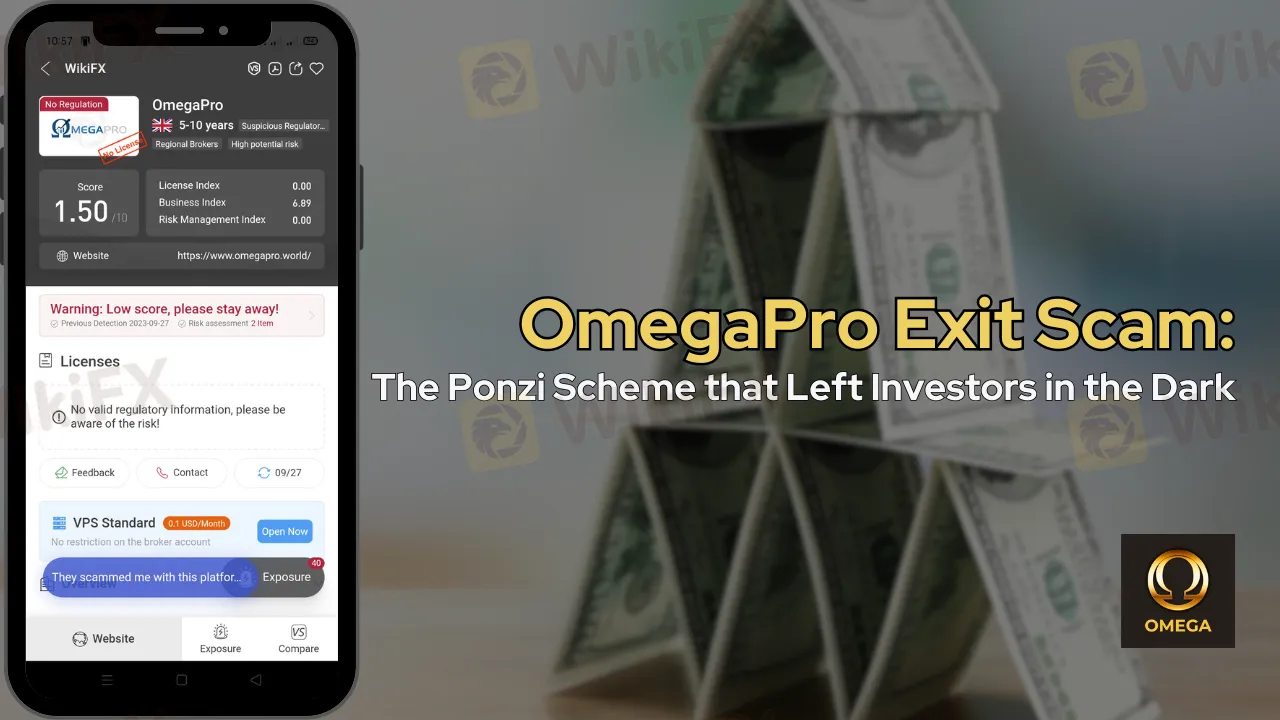简体中文
繁體中文
English
Pусский
日本語
ภาษาไทย
Tiếng Việt
Bahasa Indonesia
Español
हिन्दी
Filippiiniläinen
Français
Deutsch
Português
Türkçe
한국어
العربية
OmegaPro Exit Scam: The Ponzi Scheme that Left Investors in the Dark
Abstract:OmegaPro Exit Scam: An Inside Look at the Ponzi Scheme That Shattered Investor Trust" Uncover the story of OmegaPro's rise and fall, the warning signs to watch for in investments, and lessons learned from this cautionary tale.

Introduction
In this article, we will look at an important problem that has touched many investors: the OmegaPro scandal and its contentious withdrawal. The OmegaPro narrative serves as a cautionary tale, emphasizing the need to do comprehensive research and exercising skepticism when it comes to “too good to be true” investment prospects. Let's go through what occurred, why it went wrong, and what you need to know to prevent falling into the same pitfalls in the future.
The Allure of OmegaPro
Initially, OmegaPro attracted a considerable following with the promise of astronomical returns. The company claimed to offer a 200% Return on Investment (ROI) in just 16 months, all thanks to their secret AI bot technology. However, this technology was never disclosed or verified, creating an atmosphere of mystery around its business model. People like Arturo claimed to have cashed out substantial amounts, making it seem like a legitimate opportunity.
Red Flags
When a company promises guaranteed returns, that's a red flag right there. Investments are inherently risky, and no one can predict market fluctuations with 100% certainty. So, when OmegaPro announced such an attractive ROI without revealing the mechanics behind their “AI bot technology,” it should have been a moment for prospective investors to pause and think.
The Ponzi Scheme Unfolds
Like many Ponzi schemes, OmegaPro worked well for early adopters. These schemes often use new investor money to pay off the older ones, making it appear legitimate. But this house of cards eventually falls apart. As new investors dry up, the money to pay off the previous investors runs out, leading to what many refer to as an “exit scam.”

Public Warnings
Various countries, including France, Belgium, Congo, Spain, Mauritius, Argentina, Colombia, Peru, Chile, and Nicaragua, issued fraud warnings against OmegaPro. Despite this, many continued to believe in the enterprise, defending it against naysayers who questioned its validity.
The End of the Road
Towards the end of 2022, OmegaPro announced a collapse due to alleged “hackers.” But since then, the company has maintained radio silence, providing no updates or options for individuals to withdraw their money. Official accounts, like their Twitter, haven't been updated since December 2022. Such behavior should serve as the final red flag for investors, confirming the Ponzi scheme suspicions.
Lessons Learned
- Always scrutinize guaranteed ROI claims.
- Research the technology or strategy that a company claims to employ.
- Pay attention to public warnings from financial institutions and governments.
- Be wary of companies that lack transparency and consistent communication.
Related news
Conclusion
OmegaPro serves as a harsh reminder that if something looks too good to be true, it probably is. While some early investors may have been fortunate, many others lost significant amounts of money. When considering an investment opportunity, always remember: that due diligence is key. If it looks like a duck, swims like a duck, and quacks like a duck, it's probably a duck.
So, before you invest your hard-earned money into the next “big thing,” make sure to research thoroughly, consult experts, and take public warnings seriously.
Stay safe and invest wisely.
Keep updated on the latest news of OmegaPro by installing the WikiFX App on your smartphone.
Download the App here: https://www.wikifx.com/en/download.html

Disclaimer:
The views in this article only represent the author's personal views, and do not constitute investment advice on this platform. This platform does not guarantee the accuracy, completeness and timeliness of the information in the article, and will not be liable for any loss caused by the use of or reliance on the information in the article.
Related broker
Read more

Indonesia officially joins the BRICS countries
Indonesia's decision to join the BRICS group will not only enhance economic cooperation within BRICS countries but is also expected to have a profound impact on global trade, investment, and the currency system.

Attention! Goldman Sachs Cuts Gold Target to $2910
As the Fed slows rate cuts, gold's price growth may be limited. Goldman Sachs revised its short-term forecast, expecting gold to reach $3,000 per ounce by mid-2026.

Inflation Rebounds: ECB's Big Rate Cut Now Unlikely
German inflation has surged once again, exceeding the 2% target for the second consecutive time. The overall inflation rate for the Eurozone, which is expected to be released on Tuesday, is also likely to show a slight increase, diminishing expectations for a large interest rate cut by the European Central Bank (ECB).

Malaysian Pilot Loses RM1.36 Million in UVKXE Investment App Scam
A Malaysian pilot, aged 50, has suffered a staggering financial loss of RM1,366,885 to a fraudulent investment scheme promoted via Instagram. The scheme involved an app called UVKXE, which claimed to offer attractive investment opportunities.
WikiFX Broker
Latest News
Ghana Trader Jailed for $300K Forex and Crypto Scam
US Dollar Surge Dominates Forex Market
Hong Kong Police Bust Deepfake Crypto Scam Syndicate Involving $34 Million
Is it a good time to buy Korean Won with the current depreciation?
Pepperstone Sponsored the "Aston Martin Aramco Formula One Team"
ACY Securities Integrates MetaTrader 5 to Enhnace Copy Trading Service
Soegee Futures Review: Should You Trust This Broker?
Malaysian Pilot Loses RM1.36 Million in UVKXE Investment App Scam
Indonesia officially joins the BRICS countries
Attention! Goldman Sachs Cuts Gold Target to $2910
Currency Calculator







